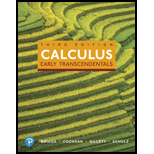
Concept explainers
Steady states If a function f represents a system that varies in time, the existence of
74. The population of a colony of squirrels is given by
Trending nowThis is a popular solution!

Chapter 2 Solutions
Calculus: Early Transcendentals (3rd Edition)
Additional Math Textbook Solutions
Elementary Statistics (13th Edition)
University Calculus: Early Transcendentals (4th Edition)
A First Course in Probability (10th Edition)
A Problem Solving Approach To Mathematics For Elementary School Teachers (13th Edition)
Algebra and Trigonometry (6th Edition)
- Let h(x, y, z) = — In (x) — z y7-4z - y4 + 3x²z — e²xy ln(z) + 10y²z. (a) Holding all other variables constant, take the partial derivative of h(x, y, z) with respect to x, 2 h(x, y, z). მ (b) Holding all other variables constant, take the partial derivative of h(x, y, z) with respect to y, 2 h(x, y, z).arrow_forwardmath help plzarrow_forwardYou guys solved for the wrong answer. The answer in the box is incorrect help me solve for the right one.arrow_forward
- Please help me solve.arrow_forwardj) f) lim x+x ex g) lim Inx h) lim x-5 i) lim arctan x x700 lim arctanx 811xarrow_forward4. Evaluate the following integrals. Show your work. a) -x b) f₁²x²/2 + x² dx c) fe³xdx d) [2 cos(5x) dx e) √ 35x6 3+5x7 dx 3 g) reve √ dt h) fx (x-5) 10 dx dt 1+12arrow_forward
- Please help on both Part b) and c) below Thanksarrow_forwardfind the zeros of the function algebraically: f(x) = 9x2 - 3x - 2arrow_forwardRylee's car is stuck in the mud. Roman and Shanice come along in a truck to help pull her out. They attach one end of a tow strap to the front of the car and the other end to the truck's trailer hitch, and the truck starts to pull. Meanwhile, Roman and Shanice get behind the car and push. The truck generates a horizontal force of 377 lb on the car. Roman and Shanice are pushing at a slight upward angle and generate a force of 119 lb on the car. These forces can be represented by vectors, as shown in the figure below. The angle between these vectors is 20.2°. Find the resultant force (the vector sum), then give its magnitude and its direction angle from the positive x-axis. 119 lb 20.2° 377 lbarrow_forward
- Algebra & Trigonometry with Analytic GeometryAlgebraISBN:9781133382119Author:SwokowskiPublisher:Cengage
 Functions and Change: A Modeling Approach to Coll...AlgebraISBN:9781337111348Author:Bruce Crauder, Benny Evans, Alan NoellPublisher:Cengage Learning
Functions and Change: A Modeling Approach to Coll...AlgebraISBN:9781337111348Author:Bruce Crauder, Benny Evans, Alan NoellPublisher:Cengage Learning Glencoe Algebra 1, Student Edition, 9780079039897...AlgebraISBN:9780079039897Author:CarterPublisher:McGraw Hill
Glencoe Algebra 1, Student Edition, 9780079039897...AlgebraISBN:9780079039897Author:CarterPublisher:McGraw Hill 
 Algebra and Trigonometry (MindTap Course List)AlgebraISBN:9781305071742Author:James Stewart, Lothar Redlin, Saleem WatsonPublisher:Cengage Learning
Algebra and Trigonometry (MindTap Course List)AlgebraISBN:9781305071742Author:James Stewart, Lothar Redlin, Saleem WatsonPublisher:Cengage Learning Big Ideas Math A Bridge To Success Algebra 1: Stu...AlgebraISBN:9781680331141Author:HOUGHTON MIFFLIN HARCOURTPublisher:Houghton Mifflin Harcourt
Big Ideas Math A Bridge To Success Algebra 1: Stu...AlgebraISBN:9781680331141Author:HOUGHTON MIFFLIN HARCOURTPublisher:Houghton Mifflin Harcourt





